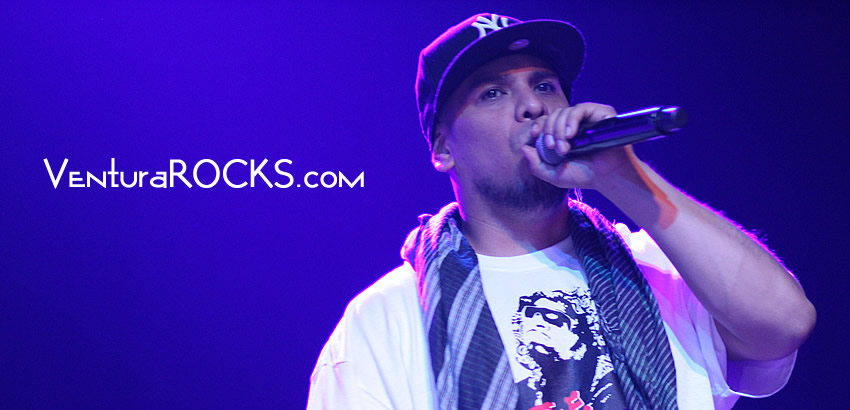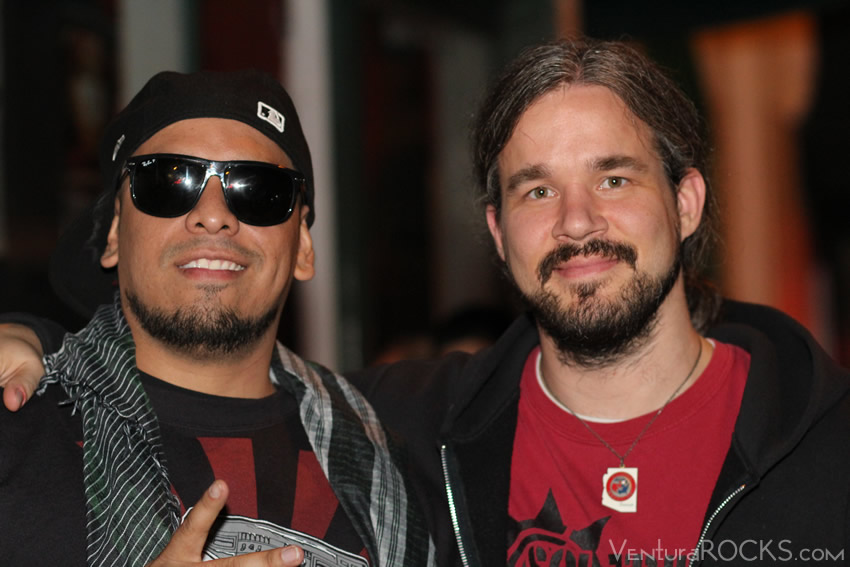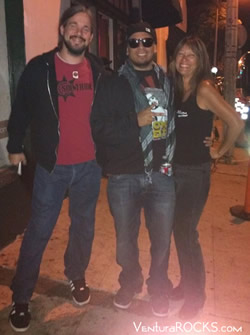Immortal Technique’s management contacted VenturaRocks.com to see if we’d like to do an interview with Tech when he would be headlining the War and Peace Tour at the Ventura Theater on Thursday, September 12. We put out our feelers immediately to a couple of artists here in Ventura who know Hip Hop and Rap. We thought it would be interesting to have one of our local artists conduct the interview and drummer Adam Clark immediately stepped up to the task.
About Immortal Technique:
A Harlem-based emcee who progressed through the ranks of the New York City battle rap scene and found success as a recording artist. Although he is a accomplished lyricist, Immortal Technique is also widely known as a voice of Revolution/activism. The Billboard charting artist has sold over 250,000 records and been hard at work preparing his long awaited 4th album The Middle Passage, and recently released an award winning DVD entitled The (R)evolution of Immortal Technique (directed by Cary Stuart).
About Adam Clark:
Adam arrived on Ventura’s local music scene a little over a year ago and quickly earned a reputation as one of the best jazz drummers on the scene. Ken Winter, writer for L.A. Jazz Scene, wrote recently, “One of the best drummers I have ever heard, Adam Clark, drives any band he plays with.” Adam quickly became one of the hottest drummers in demand and can be found either playing with Tommy Marsh and Bad Dog, Two Trees, his own Adam Clark Band, along with a number of different projects.
Adam has been a fan of Immortal Technique since 2007 and was well-prepared for the interview.
Interview between Adam Clark and Immortal Technique took place the evening of the Ventura Theater’s War and Peace tour stop on Thursday, September 12, 2013.
NOTE: This interview has been transcribed and contains adult language that could be offensive to the reader:
Adam Clark: Today we have one of the most influential hip hop artists of all time and what I consider to be the most thought provoking of all the conscious hip hop MCs of the 21st century, Mr. Immortal Technique. Thank you for coming to Ventura man and taking the time to do this interview.
As musicians and artists, we always start off as fans of the music, I’d like for the people listening to this interview to get to know who influenced you as a conscious hip hop artist. Which of the legendary MCs is Immortal Technique a fan of and consequently who should the younger generation of hip hop artists get to know as a foundational artist of hip hop?
Immortal Technique (hereafter “Tech“): I grew up listening to Miles Davis, Coltrane, Bob Marley, Michael Jackson, Jesus Christ anybody…the Beatles, people rapping on the street corner. I think for me it was less of listening to it solely on the radio or having 45’s. I know a lot of people tell me, they’re like, “Oh man, I grew up watching this or doing that.” For me, I grew up in New York City in the 80s, all I had to do to see hip hop was to walk out my front door. I didn’t have to fuckin’ buy a CD. I didn’t have to buy vinyl, I didn’t have to anything. I had to go to a park on a Friday and people were rapping. I had to walk down the street towards the high school and people were battling. You know what I mean? Obviously, I was exposed to it a lot more as I got older because they let you out of the house, but it was everywhere. You’d see people beatboxing. When I started rhyming, I’d tell people I could rhyme every since I was about nine years old. I started making up rhymes in the car. And it was because brother, back in the day on the radio it wasn’t just Top 40 all the time. On the radio they actually use to spin breakbeats. But that’s crazy for us to think about now. Imagine a major radio station here, It’s like “Oh for the next fucking two hours I’m just gonna have a DJ slice up, cut up breakbeats.” You know, going back and forth. “Hey if anybody’s out there, we got some shit for niggers to rap to.” That’s unheard of now. So I think I had the benefit of immersion.
It’s like . . . how come this Rosetta Stone program is working such a slow pace for this kid or he’s got French class, and here’s this other kid, he picked it up like this [snaps his fingers]. Well he lives in France dude, or you dropped him off, you dropped him in some immersion school where people speak nothing but. So when I was a child, I spoke the language of hip hop.
Adam: Nice. You know they say the best way to learn the language is to move to that country.
Tech: Well the country for hip hop was New York City.
Adam: Exactly. For the older generation that didn’t grow up with hip hop music, how would you describe the difference between conscious hip hop and rap, or rhythm and poetry?
Tech: well for me it’s funny, the people always ask me how I feel about that word, that connotation. I don’t really consider it, what I do conscious music per se. Because conscious doesn’t really imply that you’re going to do anything. It’s just that you know things. For example, how many people do you think in this city know that their fucking congressman is a crook? Or that the President doesn’t have the people’s best interest in mind when he signs things like the Monsanto Act? You know what I mean? How many people know that? Being conscious of something doesn’t imply that you’re going to do anything about it. Because you’re going to be pacified and placated by all of the amenities of society offers an individual to be lead astray or to be put aside. So for me, I prefer to say that there are people who in my life who influence me to be a revolutionary, to be active. To say you know what? I don’t just want to know what’s wrong, I want to know how it’s been wrong in the past. I want to know what’s been done about it in the past. Because all these problems that we see today of a Republic that moves towards empire becomes militarized, you know, that’s part of history. That’s part of the Roman experience where you can go back 2000 years and see evidence of that. The problem is that we have a real issue with confront the mythology of America which prevents us from putting things into the proper perspective. We think that this is the first time we’ve seen this. We have a tendency to look at other governments and be like, “You guys are really fucked up. Damn, what a bunch of savages.” As if we haven’t killed a handful of our presidents, assassinated . . . . Does that make us savages? We’ve only had twenty years of peace since the Republic was founded in 1776. Doesn’t that make us warlike and just completely hell bent on our own destruction or the destruction of the world because that’s the ultimate course that non-stop war can only lead us to? So I think that without considering those particular things, you know I look at myself a lot more as a revolutionary rather than a conscious artists and if I have to explain it to people who didn’t get it, I would say hey listen man, the differences between someone who knows what wrong and someone who’s willing to change it. You know, someone who knows everything about the world, yeah congratulations! That means you’re the wisest fool in existence. Because you know everything that could help anybody, and rather than doing something about it, you just keep it to yourself and you’re sitting on a rock doing nothing.
Adam: Right on man. Actions speak. Going back to when you were talking about some of your influences man, that was really cool that you listened to Miles and Coltrane because those guys were heavy influences for me; I went to school for jazz music, so I was always listening to that.
Tech: Well, I use to play jazz trumpet.
Adam: Oh, nice!
Tech: Yeah, when I was a little kid, and my dad had all these little tapes with that stuff on there, and he had an old Chick Corea tape. . . and I’d be like, “Alright cool, I’ll listen to it.” I always liked jazz and I guess since I grew up listening to it because of my father, and then a bunch of oldies, classical music and different sits, so for me, I guess… I mean I can read music, so it’s not like one of these artists that thinks “Oh I’m a musician” and he can’t read music. You don’t know what the fuck you’re doing. But at some point, when I heard the amount of influence that jazz had on the 80s and 90s hip hop, it was a natural transfer for me. It was like: Oh! He took that loop and turned it into this, or blues or soul… You know, that’s so natural.
Adam: Having that musical background shows in your music too. How important is James Brown’s influence on hip hop as far as his rhythmic and sometimes improvised vocals as well as his drummers such as Clyde Stubblefield.
Tech: They call him the Grandfather of Hip Hop; and I think that’s the proper terminology. I think his influence is definitely huge. I think also his story mirrors some of the pitfalls that exist in this industry for all artists as well. You get out of control with drugs and all kinds of other shit, you know not to take away from his legacy but that is also an indicator of things that we need to change about this business. You know when you get involved, you got to separate the street from the business. You got to learn to separate what you want to do from what you have to do. It feels good to party every night, but you can’t do that if you’re sitting here trying to get something done, if you’re trying to get a project advanced. I know motherfuckers who go on the road and every night’s a fucking festivity. (Laughs) And I gotta admit, I don’t mind jumping on the tour for three or four days, but God Dammit, if I’m on that tour for four months, when I get home I won’t know who the fuck I am! Which is crazy. I think everything in moderation has to be considered. But in terms of James Brown’s legacy, like the musical aspects of it, he went through so many periods of change in his sound. If you go back to the 50s, he’s the same guy singing “Prisoner of Love” and that sounds like some old doo wop shit. Know what I mean? He was sitting there, doing a completely different sound and then said, “You know what? I’m going to take this sound now and I’m going to revolutionize it. I’m going to put my best foot forward, I’m going to choreograph all this stuff or I’m going to have this choreographed. I’m going to have this be spontaneous; I’m going to give it all to the show.” That was a true showman. You know what I mean? That was someone when you went to see a show; you got 100% of that man’s mind, body & soul. You could see almost as if it pained him. He fell down on his knees and damn near broke his knees sometimes falling down on the floor. It was like he wanted to hurt himself or sacrifice what he had to show you that the soul in his music is alive in you, even though you didn’t realize it.
Adam: For sure man, he’s kind of like a fighter who leaves it all in the ring; like no regrets after the show, like gave it complete 100%. So when it comes to politics in the arts, I think of artists like Fela Kuti, the inventor of Afro Beat music, Zack de la Rocha, Public Enemy, and of course Immortal Technique. What are some other artists or scholars that influence you and aren’t afraid to speak the truth, that we can be on the lookout for in the 21st century?
Tech: Of course there are greats that are still around like the illustrious Harry Belafonte, I really consider him an absolute pioneer and a great man. [He’s] someone who reaches out to a younger generation. There’s Dr. Cornell West who is definitely a positive influence in a lot of things that I do. For some of the people who may not know, in terms of historians, there’s a man by the name of John Henry Clark who passed away but his works are still available. Incredible historian about antiquity to put life 2000 or 3000 years ago into perfect perspective into how people behaved and what they believed in at that time. You know the origins of Samarian and Mesopotamia and that mythology and confronting the fact that people believed in that, the same way that people believe in Christianity, Judaism and Islam. And the same way brother, I mean the same fanaticism, the same zealotry and I’m sure the same cynicism from a few people (clapping sarcastically) “Yeah yeah, I’m here in church doing what I need to do, but I don’t really believe in any of this.” Because that’s the unspoken truth, it’s the reality behind faith today.
The majority of people who believe in a religion aren’t fanatics at all. You know what I mean? The majority of them are just Christian because their parents were Christian; or Jewish because their parents are Jewish; or Muslim because their parents are Muslim. It’s not like they had a choice. You know? It’s not like they sat down one day and took a big book of religions and said, “Oh I like this or that.” No! You were put into that life homie. And your parents were put into that life because their people were conquered by someone who had their religion. It’s wasn’t like someone just prophesied it. And that’s the majority of the percentage of people who believe in that sort of thing.
But I think reading Mr. Henry Clark’s work and the fact that he’s from Harlem and that he was one of those people who reached out, like I said, to a lot of younger generation people and said, “You need to listen young brother, we’re not talking about Black history, we’re talking about human history.” You know, we’re not talking about Indian history, we’re talking about…or about Latino history, we’re talking about indigenous people who lived on this planet who were the first Americans. Let’s talk about their lives. Let’s talk about the mass defections from European colonies because they didn’t want to live under some rigid you know religiously impressive society; whereas they sought this as a paradise.
Adam: Nice. Well to continue Mr. Clark’s knowledge and encouragement to the younger generation, what are some words of encouragement that you could offer to some high school teenagers who may be feeling depressed or maybe misunderstood by their friends or family?
Tech: I could just tell them, listen man, people always ask me how I feel about younger artists that are doing crazy shit like for example, someone asked me, how you feel about Chief Keef or one of these other artists, and I always say, hey listen dude, how do you expect me to judge somebody who I was probably worse than, when I was a kid? You know? I definitely carried guns and knives; I had a beef with all kinds of people. I used to strap a meat cleaver to my forearm. I wasn’t playing. I didn’t give a fuck. I didn’t give a shit about school. So I completely understand the worst of the worst of that reality. What I don’t understand and what I can’t understand is not having, for example, things like a father. I had a father and you know, he’s a really hard man on me, but he told me one thing that always stick in my mind, is the only thing you can control about your kids is who you have them with. Because they’re going to grow up to do whatever they want to do. You know? And at some point, irrespective in as much love and affection as you give, all that, I think I can control you and manipulate your life, you know kids aren’t stupid. They start to see through that shit. You know kids are tired of being talked about in the third person. Like, “Oh yeah, he’s such a good kid.” I’m right here motherfucker. Why you talking about me like I don’t exist? And then you expect me to exist and be everything that you want me to be. You don’t have to be anything that someone wants you to be. As long as you’re successful doing what you love to do. Motherfucker, if you want to paint. Paint. But fucking learn how to paint! Or you know what? If you’re going to do a job or you have a dream? Always have a side gig. I remind people, dude, from my personal experience I didn’t just jump into rap and expect someone to pay my fucking bills, I didn’t just leach off a woman like some fucking deadbeat coward. No dude! I had a part time job. Three days out of the week I had to be at some place from nine o’clock in the morning until fucking six p.m. at night, working at some bullshit office. Not because I wanted to, but because I had to pay these bills, you know? I pretended I didn’t speak English to work at some sweatshop, so I could get the money for fucking Revolutionary Vol 1. I invested in the most important dream. My dream. You know, not somebody else’s pipedream. That’s what I tell kids. And get your fucking side gig on my nigger. If you want to get your job done, if you have a dream, you want to start a low-rider business, you want to start a promotional company, you want to be a fucking artist like I said, or a DJ, you want to be a journalist, you want to fly airplanes. . . whatever the fuck you want to do man, realistically speaking, have something that’s going to help you learn discipline, that’s going to provide you with money to feed your family and yourself, all that. But do it in conjunction with what you’re doing. Learn two skills not just one. Don’t devote yourself to the dream until you’re ready to give up that other life; or rather don’t give up that other life until you’re willing and capable of devoting yourself to the dream. Because there was a point in my life where I finally said, OK, this is starting to pop off for me. I’m starting to get offers for shows a lot. I’m starting to get people who want to buy my CD. I’m looking at getting some distribution. Or I can tell all this to fuck off and go back to going to college part time or working part time for the next three or four years. What’s it going to be? I took my shot. But you know what? I took my shot after aiming for about a year and half of what the fuck I wanted to do. Fire with conviction.
Adam: Smart way to be. What advice could you give to a younger independent MC? For instance, now that you have hindsight as an independent artist, what are some problems you have encountered, and furthermore what are some of the solutions to those problems?
Tech: Sometimes it’s not great to do business with friends and family, because it’s harder to fire friends and family. And sometimes, people just need to be fired. Learn the business. Fuck the art and all that other shit, if you want to do this as your life, that’s only one side of this, as fucked up as this sounds. You know, I’m not saying, fuck art. I’m saying your art will be fucked if you don’t learn the business. That’s what I’m telling you. I’m telling you that having great power without perception is not just economically and politically, it’s also spiritually useless. If you’re going to be put in that position, you know, that’s your livelihood. You have to ensure you’re not the one that’s used; you have to ensure the people aren’t manipulating you for your music to go somewhere. Let’s say you’re song is about artist freedom, and then someone wants to get it to be on like a cigarette commercial. So what you really do my nigger? (laughs and says sarcastically) “Wow! You’re really free sucking on that cancer stick bro.” And at some point, what are you really going to do with what you’ve done? Consider that. Consider what impact you want your music to make with other people. Do you want to inspire or change? Or do you not care and just want to get the money? I mean answer these questions honestly. You don’t have to answer to me. Fuck me, you don’t care about me and my opinions are useless. Answer them for yourself. If you’re in hip hop to get women, then you’re a fucking idiot, you know? You should be doing Salsa, or some sort of Spanish music; (laughs) because the amount of women at those shows far outweigh anything you’re going to see in hip hop. You know, if you’re going to do music because you want money, then more likely to [sic] get a job being a lawyer, or doing some other shit because that’s a guaranteed payday. As oppose to this which is not a guaranteed payday. Not always. The people you see on TV are not the rule. They’re the exception to the rule. And everything is political about it. So I tell people regardless of what you think is the measure of success, realize that’s only something that is applicable to your life. And I tell artists all the time if you’re not going to participate in getting that business right, then you will find yourself taken advantage of. You will find yourself being a pawn in someone else’s game, unfortunately. I definitely have experienced people trying to control my career and that’s why I remain independent, that’s why I work with people I trust. And it also helps to be around motherfuckers that known you for a long time, and they can tell you about yourself. You know if you surround yourself with a bunch of yes men, then you’re never really going to have perspective. You’ll just have people who agree with all the bad decisions you make. That’s all I can tell you bro.
Adam: Right on. Cool. Thanks for your time and for speaking with us.
Pam (sneaking in at end of interview): Can I ask a question? What do you hope the kids take away from your show? What do you hope to inspire in them?
Tech: See that’s one thing I’ve always kind of left up to them, because people have used it for so many different things. I just say that I hope that it inspires some positive thing in their life, or inspires them to confront some negative things in their life. I’ve had people come up to me and say, “I really wished that you had been there for me.” And I’d be, “I don’t know you.” “Yeah but like your music, I wish I had it when I was 12. Some really fucked up things were happening in my own house. I found a way to confront it and found that it wasn’t my own fault. Through your music.” If I could do that for people, if I can make them confront their demons and show them that if they call them by their name, then they have no power. That’s the way you caste the devil out. You call it by its name. You can’t stop being an alcoholic until you admit you have a problem with alcohol. You can’t stop being a drug addict until you admit that you have a problem with drugs.
Pam: Nicely put. Thank you.
TECH:
www.twitter.com/ImmortalTech
www.ViperRecords.com
www.MySpace.com/ImmortalTechnique
ADAM:
www.twitter.com/AdamClarkDrums
https://www.facebook.com/AdamClarkDrums
www.LosAngelesDrummer.com
Photos of that evening’s concert plus a few with fans and Tech after we did the interview:
- Immortal Technique
- Immortal Technique
- Immortal Technique
- Immortal Technique
- Fan with Tech
- Fan with Tech
- Fan with Tech
- Adam, Tech and Pam
- Tech and Adam












